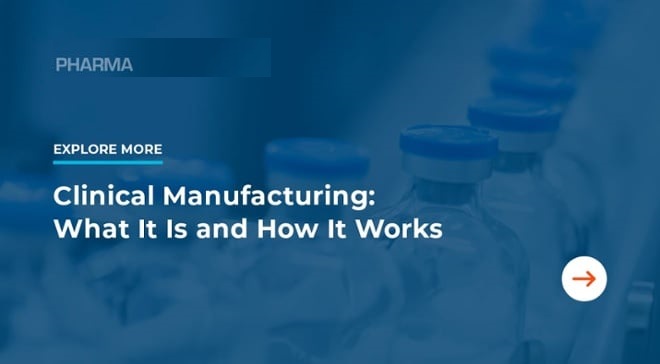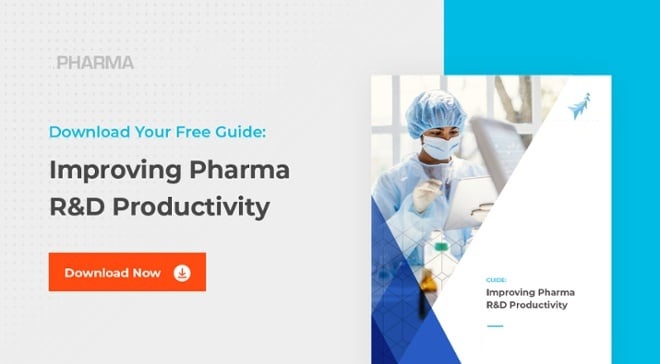Lyophilization Contract Manufacturing Services: What to Know
Lyophilization contract manufacturing services are beneficial for pharmaceutical and biopharmaceutical companies who lack the necessary resources and expertise to produce their own lyophilized products. Lyophilization is a meticulous process, but with experienced professionals to help guide the way, an effective lyophilized drug can be produced in a short amount of time. When outsourcing this delicate procedure, there are a few key factors to consider to find the best possible match for your drug development project.
In this article, we'll discuss the basics of lyophilization in the pharmaceutical industry, along with tips on how to select a contract development and manufacturing organization (CDMO) for lyophilization outsourcing.
What Is Lyophilization?
Lyophilization is a process that removes moisture from a product while preserving its original chemical properties. Also known as freeze drying, this process is used in the production of many products, such as pharmaceuticals, biologics, food additives, and nutraceuticals. Lyophilization helps to reduce spoilage and extend the shelf life of a product, making it more stable and easier to transport.
Pharmaceutical companies use lyophilization to make lyophilized injections, eye drops, other sensitive drugs, and parenteral dosage forms that cannot be manufactured through traditional methods. In the biopharmaceutical industry, lyophilization is used to preserve proteins and peptides for long-term storage, giving unstable biologics the shelf life and stability for more widespread distribution and use.
Related Read - Accelerating the Biologics Development Process
How Drugs Are Lyophilized
Naturally, the process of lyophilization in the pharmaceutical industry is quite different from freeze drying foods and other consumer products. Here's a step-by-step overview of how lyophilized drugs are made:
 1. Freezing
1. Freezing
Also known as pre-drying, during this step the product is mixed with an excipient before being frozen in vials or containers. The excipient helps to absorb moisture and stabilize the product during lyophilization.
2. Primary Drying
The frozen product is placed inside a vacuum chamber and sublimated, transforming the solid directly into a gas without passing through a liquid phase. This step is also known as sublimation.
3. Secondary Drying
During this stage, which is sometimes referred to as desorption, the product is exposed to a cold temperature and low pressure. This helps push any residual water molecules out.
4. Analysis
The lyophilized drug is tested to ensure its stability, dose uniformity, sterility, and quality. This is accomplished through a variety of methods, including spectroscopy and chromatography.
5. Packaging
Lyophilized drugs must be packaged in an air-tight aseptic container to prevent moisture from entering.
Related Read: Aseptic Pharmaceutical Manufacturing: How It Works
Benefits of Lyophilization
There are many reasons why lyophilization is being increasingly used in the development of drugs, including parenteral, and biologics.
Reliability
Lyophilization is a reliable, efficient, and cost-effective method of manufacturing drugs. The process ensures that the product is stable, can be stored at room temperature, and has an extended shelf life.
Storage
Lyophilized products last longer than liquid or air-dried versions because they are completely insulated in a vacuum-sealed environment, eliminating the risk of dehydration or contamination. Shelf life is optimized with lyophilization, improving the product's long-term stability and transportability.
Cost Savings
Lyophilization is much less expensive than many other drug production approaches, making it a cost-effective solution for many companies. By outsourcing lyophilization services to a contract manufacturer, companies can save money by avoiding costly equipment purchases and greatly reduce labor costs associated with manpower.
Ease
Additionally, lyophilization is a fast, easy process with minimal equipment required. Lyophilized products can be stored in ready-to-use form and reconstituted quickly when needed for use in medical or clinical settings. This eliminates the need for cold storage, making it an ideal option for shipping or storing drugs that are unstable in other forms.
Related Read: Clinical Manufacturing: What It Is and How It Works
Examples of Lyophilized Products
Pharmaceutical products that can be produced through lyophilization include:
- Vaccines – Vaccines are commonly lyophilized to preserve potency and extend shelf life.
- Antibiotics – Lyophilization is often used for antibiotics, as it eliminates the need for preservatives and keeps them in a stable state.
- Hormones – Hormonal drugs are easily stabilized with lyophilization, making them easier to transport.
- Proteins – Proteins can be preserved and released in a controlled manner using lyophilization methods.
- Peptides – Peptides are highly sensitive to their environment, so lyophilization is often used to ensure product stability and effectiveness.
- Enzymes – Enzymes can be effectively stabilized and preserved through common lyophilization methods.
Lyophilized products are also used to produce drugs that are easier to store and administer. For example, injectable insulin has been freeze-dried for ease of use, enhanced pulmonary delivery, and improved storage.
Related Read: Long-Acting Injectables (LAIs): Benefits & Drug Development
Lyophilization Cycle Development
Once a product has been identified as requiring lyophilization, the next step is to develop the specific cycle that will be used in its production. This includes the temperature and pressure settings, as well as the duration of each stage.
 The process of lyophilization can be optimized to improve the performance and stability of the end product. Lyophilization optimization involves testing different parameters, such as temperature, pressure, and duration, to find the ideal combination that results in the highest quality final product. The right lyophilization partner will have the necessary knowledge and expertise to develop a lyophilization cycle suitable for a particular drug, which is why it’s imperative to choose your outsourcing partner wisely.
The process of lyophilization can be optimized to improve the performance and stability of the end product. Lyophilization optimization involves testing different parameters, such as temperature, pressure, and duration, to find the ideal combination that results in the highest quality final product. The right lyophilization partner will have the necessary knowledge and expertise to develop a lyophilization cycle suitable for a particular drug, which is why it’s imperative to choose your outsourcing partner wisely.
An example of lyophilization optimization is increasing the temperature of the product during the process to reduce cycle time and improve product stability. (Note: As a provider of lyophilization services, Amachems Pharmaceuticals can help optimization by testing different parameters, providing valuable insight into what works best for your particular product.)
In addition to developing the cycle, the right provider will also house the necessary equipment to perform the process. This includes freeze dryers, which use a combination of reduced temperature and pressure to remove moisture from the product. Other items, such as cold traps, vacuum pumps, and temperature controllers, may also be necessary for the lyophilization process.
Related Read: Factors to Consider When Selecting a CDMO for Complex Injectables Development and Manufacture
Aseptic Lyophilization
For products that require an extra level of care, companies may opt for aseptic lyophilization. This is a process where the product is produced in an environment that has been rigorously sterilized to ensure no bacteria or other microbial contamination takes place. The process also requires specialized equipment and expertise which can be supplied by an experienced pharmaceutical contract manufacturing services provider.
Aseptic drugs are necessary when a product is sensitive to any type of microbial contamination, so it’s important that this process be performed by a trustworthy partner.
cGMP for Lyophilized Drugs
Current Good Manufacturing Practices (cGMP) are required when producing all pharmaceuticals. For lyophilized drugs, there is a set of specific requirements that must be followed to ensure a product meets safety standards and remains effective over time. Pharmaceutical and biopharmaceutical companies who produce such products should hire a CDMO partner who can guarantee they are adhering to all GMP guidelines.
When it comes to producing lyophilized products, the process can be complex and requires specialized expertise to ensure a successful outcome. With the right lyophilization and contract manufacturing services, however, these delicate processes can be managed effectively to deliver an effective drug that meets all regulatory requirements.
Companies should look for a partner with a proven track record in the industry who can provide the necessary equipment, cycle development, and cGMP compliance. With the right CDMO, your lyophilization process will be safe and effective.
Related Read: cGMP vs GMP: What's the Difference?
Finding the Right Partner for Lyophilization Contract Manufacturing Services
There are many advantages to outsourcing your lyophilization needs. Partnering with a well-qualified lyophilization company, such as Amachems Pharmaceuticals, will save you time and money since you don’t have to purchase or maintain costly machinery or pay for employee training. The right partner can also manage the entire process from start to finish, ensuring that your product is properly lyophilized, packaged, and shipped according to your specifications.
Amachems Pharmaceuticals are well-versed in this process, so we can troubleshoot any issues that may arise during production. This reduces the risk of costly delays or errors due to lack of understanding and experience.
When selecting a contract development and manufacturing organization (CDMO), it’s important to find one that meets your specific needs and requirements. You should evaluate each company’s capabilities, including their experience and expertise in lyophilization, as well as their production capacity and turn-around time.
By taking the time to research and select a reputable partner, you can be sure that your drug is manufactured with quality and consistency. This will also reduce your risk of delays and help you meet deadlines more efficiently. In turn, this can drive down costs and ensure customer satisfaction when your product goes to market.
Related Read: Improving Pharma R&D Productivity: A Guide
Work with Amachems Pharma
If you’re looking for a partner with a proven track record in the industry who can provide the necessary equipment, cycle development, and GMP compliance, Amachems Pharma has more than a decade of experience working with difficult-to-formulate drugs. Find out why our BEST approach makes us the Partner of Choice for so many of the world’s leading pharmaceutical companies.
To learn more about partnering with Amachems, contact us today.
.png)
.png)
.png)
.png)



